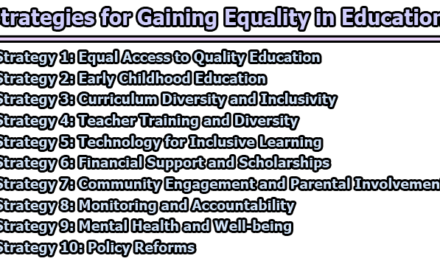Leadership is considered one of the essential elements for school success. School leadership is the process of motivating, directing, and guiding people in the school system toward achieving their educational objectives. It is concerned with creating a shared vision, developing a plan of action, and managing the resources necessary to implement that plan. School leadership is critical to the success of a school because it determines the direction, culture, and overall success of the school. In this article, we will discuss the impact of school leadership on student achievement and the various aspects of leadership that contribute to this impact.
Importance of School Leadership:
Effective school leadership is essential for the success of a school. The leader sets the tone for the school, establishes the school’s vision and goals, and provides the direction and guidance necessary for teachers and students to achieve those goals. Effective leadership also creates a positive school culture that fosters learning, collaboration, and innovation. School leaders are responsible for creating an environment that encourages teachers to work together to improve student outcomes, and they are also responsible for ensuring that the school has the necessary resources to support student achievement.
Impact of School Leadership on Student Achievement:
Research has shown that effective school leadership is strongly associated with improved student achievement. A study by Leithwood and Jantzi (2005) found that schools with effective leadership had students who performed significantly better on standardized tests than schools with ineffective leadership. The study also found that schools with effective leadership had higher rates of student attendance and lower rates of student dropout.
Another study by Robinson, Lloyd, and Rowe (2008) found that effective leadership had a significant impact on student achievement, with effective leadership accounting for approximately 25% of the variation in student achievement. The study also found that effective leadership had a greater impact on student achievement in schools with high levels of poverty.
In addition to improving student achievement, effective school leadership has been shown to have other positive impacts on schools, including improved teacher retention rates, higher levels of teacher satisfaction, and improved school culture.
Aspects of School Leadership that Contribute to Student Achievement:
Several aspects of school leadership contribute to student achievement. These include:
- Vision and Mission: Effective school leaders have a clear vision and mission for their school. They develop a shared vision that is focused on student success and provides a roadmap for achieving that success. The vision and mission are communicated to all stakeholders, including teachers, students, parents, and the community.
The school leader’s vision and mission should align with the school district’s goals and objectives. The vision and mission should also be aspirational and challenge teachers and students to reach their full potential. When teachers and students are motivated and inspired by the school leader’s vision and mission, they are more likely to work together to achieve the school’s goals, resulting in improved student achievement.
- Instructional Leadership: Effective school leaders provide instructional leadership by setting high expectations for teaching and learning, promoting professional development, and providing feedback and support to teachers. Instructional leadership involves creating a culture of continuous improvement, where teachers are encouraged to try new strategies and techniques to improve student learning.
Effective school leaders also understand the importance of data-driven decision-making. They collect and analyze data regularly to monitor student progress and identify areas where teachers need additional support. By providing feedback and support to teachers, school leaders can help them improve their instruction, resulting in improved student achievement.
- School Culture: Effective school leaders create a positive school culture that promotes collaboration, innovation, and learning. They foster a culture of trust and respect among teachers, students, and parents. A positive school culture is essential for student success because it creates a safe and supportive environment where students feel valued and supported.
Effective school leaders also promote a growth mindset among teachers and students. They encourage teachers and students to view challenges as opportunities for growth and learning. By promoting a growth mindset, school leaders can help teachers and students develop resilience, which is essential for academic success.
- Resource Management: Effective school leaders manage resources efficiently and effectively. They ensure that the school has the necessary resources to support student achievement, including funding, technology, and personnel. Effective resource management involves balancing the school’s budget, making strategic investments in technology and personnel, and collaborating with the community to secure additional resources.
Effective school leaders also understand the importance of equity in resource allocation. They ensure that all students have access to the resources they need to succeed, regardless of their background or socioeconomic status.
- Accountability: Effective school leaders hold themselves, teachers, and students accountable for student achievement. They set high expectations and monitor progress regularly. Effective accountability involves providing feedback and support to teachers and students, recognizing and celebrating successes, and addressing areas where improvement is needed.
Effective school leaders also understand the importance of transparency in accountability. They communicate regularly with stakeholders, including parents and the community, to ensure that everyone is informed about student progress and school performance.
In conclusion, effective school leadership is critical to the success of a school. Effective school leaders have a clear vision and mission for their school, provide instructional leadership, create a positive school culture, manage resources efficiently and effectively, and hold themselves, teachers, and students accountable for student achievement. By focusing on these aspects of leadership, school leaders can create an environment that supports student success and achievement. The impact of school leadership on student achievement is clear, and it is essential for school leaders to prioritize effective leadership to ensure that students have the best possible chance for success.
References:
- Fullan, M. (2001). The new meaning of educational change (3rd ed.). New York: Teachers College Press.
- Hallinger, P. (2011). Leadership for 21st-century schools: From instructional leadership to leadership for learning. Journal of Educational Administration, 49(2), 122-132.
- Heck, R. H., & Hallinger, P. (2010). Collaborative leadership and school improvement: Understanding the impact on school capacity and student learning. School Leadership & Management, 30(2), 95-110.
- Hitt, D. H. (2011). School leadership and student achievement: The mediating effects of teacher beliefs. Educational Administration Quarterly, 47(3), 462-494.
- Leithwood, K., & Jantzi, D. (2006). Transformational school leadership for large-scale reform: Effects on students, teachers, and their classroom practices. School Effectiveness and School Improvement, 17(2), 201-227.
- Leithwood, K., Louis, K. S., Anderson, S., & Wahlstrom, K. (2004). How leadership influences student learning. Retrieved from https://eric.ed.gov/?id=ED484323
- Marzano, R. J., Waters, T., & McNulty, B. (2005). School leadership that works: From research to results. Alexandria, VA: Association for Supervision and Curriculum Development.
- Robinson, V. M., Lloyd, C. A., & Rowe, K. J. (2008). The impact of leadership on student outcomes: An analysis of the differential effects of leadership types. Educational Administration Quarterly, 44(5), 635-674.
- Supovitz, J. A., Sirinides, P. M., & May, H. (2010). How principals and peers influence teaching and learning. Educational Administration Quarterly, 46(1), 31-56.
- Waters, T., Marzano, R. J., & McNulty, B. A. (2003). Balanced leadership: What 30 years of research tells us about the effect of leadership on student achievement. Aurora, CO: Mid-continent Research for Education and Learning.

Library Lecturer at Nurul Amin Degree College










